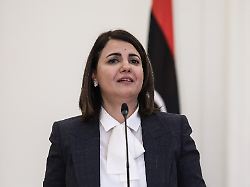Talks in Rome
Libya suspends foreign minister over Israel meeting
08/28/2023 02:24 am
A meeting with her Israeli counterpart will cost Libya’s Foreign Minister al-Mangush her job for the time being. It is said that it did not reflect the policy of the state. The highest diplomat speaks of a chance meeting, her Israeli colleague sees it differently.
Libyan Foreign Minister Najla al-Mangush has been “temporarily suspended” after an apparently unofficial meeting with her Israeli colleague Eli Cohen. The chief diplomat will be subjected to an “administrative investigation” by a commission chaired by the Minister of Justice, Prime Minister Abdelhamid Dbeibah said on Facebook on Sunday evening after information about the meeting had sparked violent protests in the North African country.
Accordingly, demonstrators called for the resignation of the government of Prime Minister Abdul Hamid Dbaiba. A video circulated on the Internet is said to show how people set fire to Prime Minister Abdul Hamid Dbaiba’s residence. It was unclear whether Dbaiba was in the building at the time. The information could not initially be independently verified. Dbaiba reportedly released his foreign minister from her duties on Sunday to investigate the case.
Cohen’s office had just announced that the two foreign ministers had met in Rome last week. According to Jerusalem, the conversation mediated by Italy was about “the great potential of the relationship between the two countries”. In addition to possible cooperation, topics were Israeli aid in humanitarian issues, agriculture and water management. This is a “first step in relations between Israel and Libya,” Cohen said on Sunday. “Libya’s size and strategic location offer an immense opportunity for the State of Israel,” the Jerusalem statement said. Accordingly, the meeting took place under the patronage of Italian Foreign Minister Antonio Tajani. Neither Rome nor the Libyan government initially confirmed the meeting.
“Accidental and unofficial” encounter
The Libyan Foreign Ministry later described the meeting as an “accidental and unofficial” encounter. The minister “reaffirmed Libya’s position on the Palestinian cause in a clear and unequivocal manner,” it said in a statement on Sunday evening. Al-Mangush “refused to speak to any party representing the Israeli entity” and “categorically” maintained this position.
The three-member Presidential Council, which represents Libya’s three regions, was “surprised” by the reports about the meeting and is demanding “clarification” from the government, the Libyan television channel al-Ahrar TV reported, citing a letter from Presidential Council spokeswoman Najiwa Wheba . The spokeswoman confirmed the letter.
It said the meeting reflected neither “the foreign policy of the Libyan state” nor “the national Libyan constants”. It is “considered a violation of Libyan laws that criminalize normalization with the Zionist entity.” The Council called on the Prime Minister to “apply the law if the meeting took place”. The parliament in eastern Libya plans to hold an emergency session this Monday.
Contacts with Israel are punishable by law
On Sunday evening, protests broke out in Tripoli and several suburbs of the capital, the participants of which refused to normalize relations with Israel. It later spread to other cities, where protesters blocked roads, burned tires and waved the Palestinian flag.
Libya does not recognize Israel, and the two states have no formal diplomatic relations. According to a 1957 law, contacts with Israel are punishable by law. Libyan foreign policy is complicated by years of conflict and bitter internal disputes over government control and the legitimacy of all government actions in Tripoli. Since 2020, Israel has normalized its relations with the United Arab Emirates (UAE), Bahrain, Morocco and Sudan through the Abraham Accords.
Civil war broke out in Libya in 2011 after the fall of longtime ruler Muammar Gaddafi. Countless militias are still struggling for power and influence in the oil-rich state. The conflict is additionally fueled by foreign states. Two hostile governments are currently fighting for power in the country. All diplomatic efforts to resolve the conflict peacefully have so far failed.
